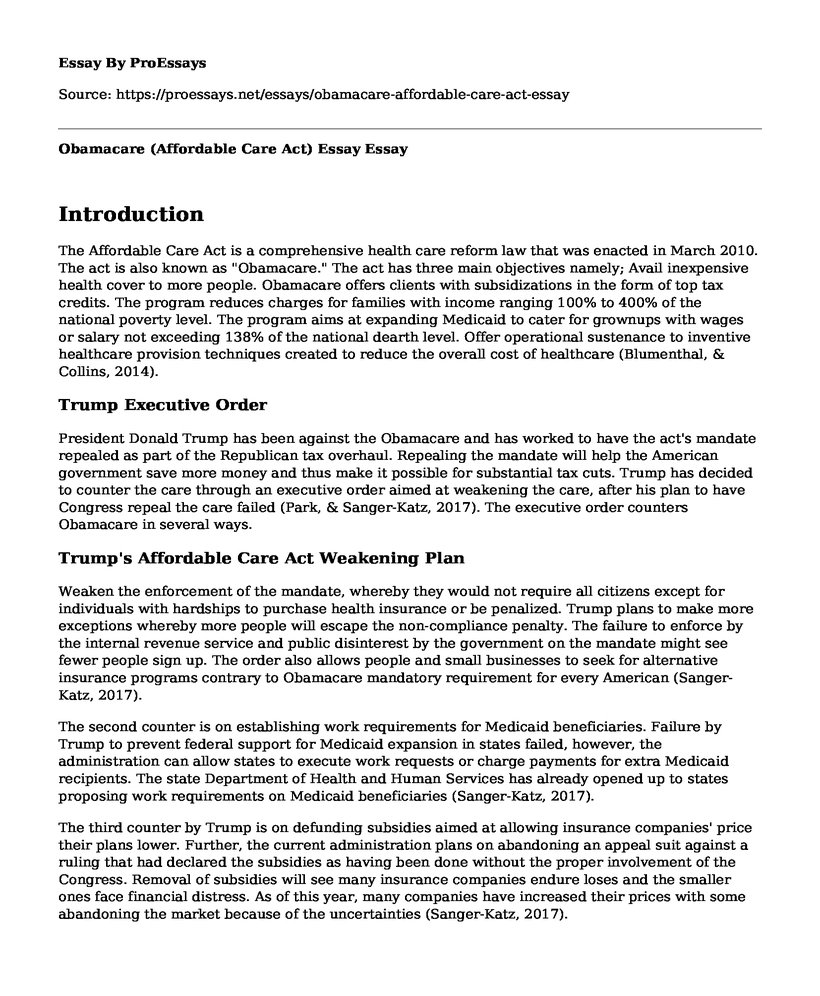Introduction
The Affordable Care Act is a comprehensive health care reform law that was enacted in March 2010. The act is also known as "Obamacare." The act has three main objectives namely; Avail inexpensive health cover to more people. Obamacare offers clients with subsidizations in the form of top tax credits. The program reduces charges for families with income ranging 100% to 400% of the national poverty level. The program aims at expanding Medicaid to cater for grownups with wages or salary not exceeding 138% of the national dearth level. Offer operational sustenance to inventive healthcare provision techniques created to reduce the overall cost of healthcare (Blumenthal, & Collins, 2014).
Trump Executive Order
President Donald Trump has been against the Obamacare and has worked to have the act's mandate repealed as part of the Republican tax overhaul. Repealing the mandate will help the American government save more money and thus make it possible for substantial tax cuts. Trump has decided to counter the care through an executive order aimed at weakening the care, after his plan to have Congress repeal the care failed (Park, & Sanger-Katz, 2017). The executive order counters Obamacare in several ways.
Trump's Affordable Care Act Weakening Plan
Weaken the enforcement of the mandate, whereby they would not require all citizens except for individuals with hardships to purchase health insurance or be penalized. Trump plans to make more exceptions whereby more people will escape the non-compliance penalty. The failure to enforce by the internal revenue service and public disinterest by the government on the mandate might see fewer people sign up. The order also allows people and small businesses to seek for alternative insurance programs contrary to Obamacare mandatory requirement for every American (Sanger-Katz, 2017).
The second counter is on establishing work requirements for Medicaid beneficiaries. Failure by Trump to prevent federal support for Medicaid expansion in states failed, however, the administration can allow states to execute work requests or charge payments for extra Medicaid recipients. The state Department of Health and Human Services has already opened up to states proposing work requirements on Medicaid beneficiaries (Sanger-Katz, 2017).
The third counter by Trump is on defunding subsidies aimed at allowing insurance companies' price their plans lower. Further, the current administration plans on abandoning an appeal suit against a ruling that had declared the subsidies as having been done without the proper involvement of the Congress. Removal of subsidies will see many insurance companies endure loses and the smaller ones face financial distress. As of this year, many companies have increased their prices with some abandoning the market because of the uncertainties (Sanger-Katz, 2017).
Argument
The Obamacare is not repealed, and neither would it main provisions be significantly affected by the executive order. The order if effected could lead to hiked premiums for some Obamacare users and less regulation for those who want to try other insurance options. The removed subsidies by Trump put insurance companies in a weird legal spot whereby they still required to offer discounts for eligible Americans. They, however, have an option to sue the government for engaging them on subsidies without consulting Congress authority. Insurance providers may also resort to charging more premiums to cover the losses, whereby, higher income customers will be the most affected because they pay full price. Apparently, Trump's strategy of weakening Obamacare is based on government reluctance to enforce it and defunding of subsidies. This plan aims at making the care plan unsustainable and not mandatory, consequently, people might seek for alternative insurance covers. The executive order is aimed at rocking Obamacare right at the foundation of the idea. The care was based on cost sharing whereby a mandatory pay for the program would avail more funds to cover the poor, the sick and elderly. The rich and small companies might decide out of Obamacare rendering the program unsustainable.
References
Blumenthal, D., & Collins, S. R. (2014). Health care coverage under the Affordable Care Act-a progress report.
Park, H., & Sanger-Katz, M. (2017). 4 Ways Trump Is Weakening Obamacare, Even After Repeal Plan's Failure. The New York Times. Retrieved from https://www.nytimes.com/interactive/2017/07/19/us/what-trump-can-do-to-let-obamacare-fail.html
Sanger-Katz, M. (2017). What We Know About Trump's Twin Blows to Obamacare. The New York Times. Retrieved from https://www.nytimes.com/2017/10/12/upshot/what-did-trumps-health-care-executive-order-do.html
Cite this page
Obamacare (Affordable Care Act) Essay. (2022, Apr 04). Retrieved from https://proessays.net/essays/obamacare-affordable-care-act-essay
If you are the original author of this essay and no longer wish to have it published on the ProEssays website, please click below to request its removal:
- Constitutional Amendments
- Benefits of Public Surveillance Cameras Essay
- Research Paper on African American Males and Capital Punishment
- Paper Example on Suspect's High Degree of Crime: Juvenile Rehab or Punishment?
- Paper Example on Convenience Stores: Crime & Police Relationships
- Essay Sample on Felony Conviction Should Not Deny US Citizens Their Right to Vote
- Should Euthanasia Be Legalized? An Argumentative Essay Example







